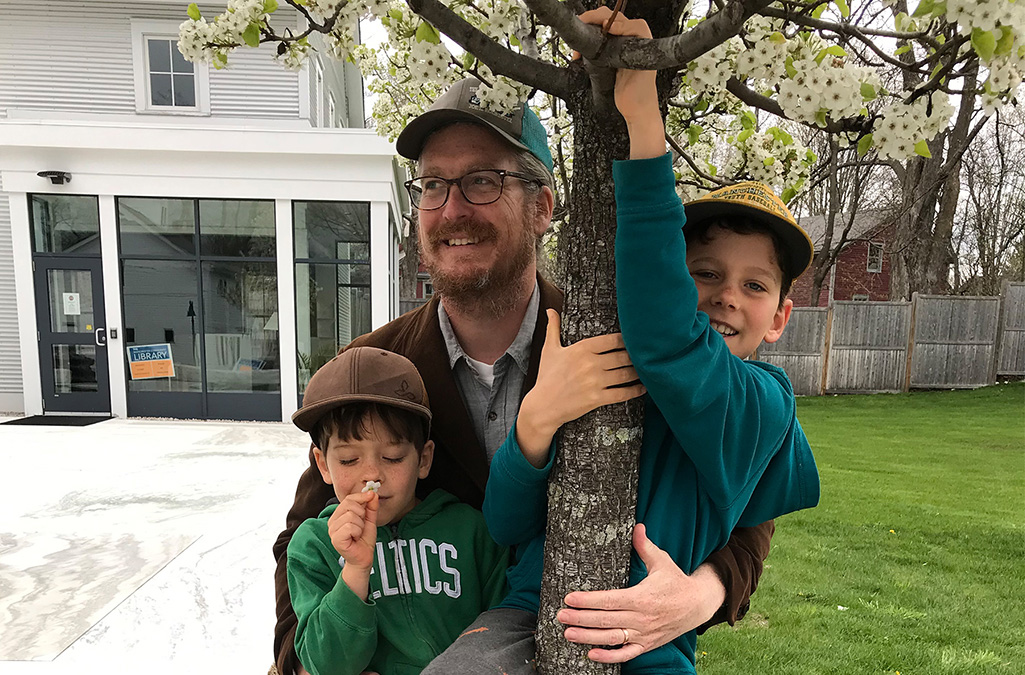Vassar’s Time Out Grant Gives Sustainable Farming Advocate More Latitude to Make a Difference
Vassar’s Time Out Grant Gives Sustainable Farming Advocate More Latitude to Make a Difference
The idea came to Pablo Elliott ’00 one quiet morning in his Vermont cottage. Elliott, a farmer and sustainable food advocate, was looking at a world map on his wall. From his location, he traced a line across the 43rd parallel in the northern hemisphere. As his finger made its journey through Europe and Asia, he thought about the special connection places along a single latitude share: the same amount of light per day. It’s a profound link that affects how food is grown, the rhythms of life—really everything. He envisioned creating a global movement to foster kinship among communities along the same latitude line for the benefit of the earth and those living on it. But where would he find the money and, more importantly, the time? He now has enough of both, thanks to a unique grant from Vassar College.

Elliott is the latest recipient of Vassar’s Time Out Grant, funded by an anonymous donor 30 years ago to give fellow alumnae/i over age 40 a solid year to pursue a dream deferred by the mundane responsibilities of middle age. Administered by Vassar’s Office of Alumnae/i Affairs and Development (OAAD), the grant amount now stands at $75,000. The only obligation upon receiving these funds is to “pursue a strongly desired endeavor” that the applicant has outlined in a proposal.
“It’s just such a beautiful gift and one that I feel honored to receive,” said Elliott. “Whoever envisioned it really understood what it is like to be in that post-40 part of life where you’ve had to make serious compromises on vision for the sake of paying bills, and you lose that spark that many of us carry around Vassar. This grant is kind of like getting a lot of oxygen into dreams and ideas.”
Elliott was selected from among 90 applicants—the largest pool to date.
“Pablo’s proposal met the true nature of the grant,” said Mary Carole Starke, OAAD’s Associate Vice President of Operations. “We look at proposals involving innovation and out-of-the-box thinking. His focus on farming and a new form of food system advocacy is certainly in line with that—and with the current pandemic, it is important for the times in which we now live.”
Elliott has been involved in farming and food systems from the time he signed on as the Poughkeepsie Farm Project’s first summer intern in 1999, between his junior and senior years as an Africana studies major at Vassar. This community-supported agriculture (CSA) program, which still exists on the Vassar Farm and Ecological Preserve, grows fresh produce, provides hands-on educational programs, and improves access to healthy, locally grown food. Several young Vassar alums who had stayed in the area after graduation got him involved, and years later they remain important advisors to his current project.
“Now it’s become such a mainstream idea being into sustainable agriculture in a liberal arts school,” said Elliott, “but back then it was really not.”
A few years after graduating, Elliott created his own CSA on some land owned by his family in Gainesville, VA, 35 miles outside of Washington, DC. He and his spouse, Esther Mandelheim Elliott ’01, worked the farm for 10 years until a new adventure called: setting up a farm and food system for an artists’ residency program in Dorset, Vermont. In 2015, Elliott, by then a father of two young boys, took his current job conducting food-safety and sustainability inspections for farm and food businesses around the country seeking various types of certifications. It pays the bills but is more than a step removed from growing things directly—and keeps him away from his family in Manchester, VT, much of the year. “When you’re on the road seventy-five percent of time, it’s really hard on the family,” he said. But thanks to the Time Out Grant, “they’ll get to see me a lot more!”
Travel will, however, be an important part of his plan for building his nascent organization, The Latitude Movement. Over the course of the grant year, which runs from July through June, Elliott plans to make six trips along the 43rd parallel including to Umbria, Italy, and Hokkaido, Japan. He also plans to create a Latitude Heritage Garden in Manchester and to host a Latitude Farm & Food summit to be attended by farmers and food producers from three continents. But he hopes the alliances created will go beyond sharing methods of sustainable food production.
“I do think that what will come out of this is essentially an enduring connection amongst latitude communities and maybe even a framework for citizen diplomacy,” he said. “I see the potential of this to really also bridge different cultures,” not just along the 43rd parallel but other latitude lines as well.
“I’m hoping a listening and open-mindedness movement evolves,” Elliott continued. “I think we’re in an age where a lot of people are speaking their minds but not a lot of people are listening to each other. There is a need for bridge-building and diplomacy between political spectrums and other gaps that we have. There’s nothing I’m angling for other than the bridge itself.”
VQ wrote about the Elliotts’ previous pursuits in an article on young farmers.